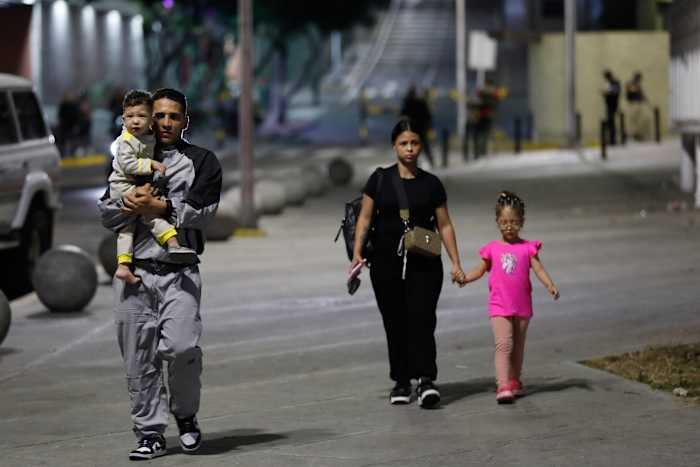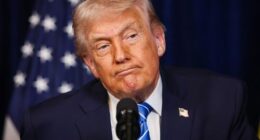Share this @internewscast.com

In a dramatic development early Saturday, the United States launched a significant military operation in Venezuela, leading to the capture and removal of President Nicolás Maduro from the country. This bold move follows months of increasing pressure from Washington. President Donald Trump revealed the news of this unprecedented nighttime operation via social media, a few hours after the events unfolded.
Caracas, the Venezuelan capital, was rocked by multiple explosions and the presence of low-flying aircraft, as Maduro’s government swiftly accused the U.S. of targeting both civilian and military sites. The Venezuelan administration condemned the actions as an “imperialist attack” and called on citizens to rally in response.
President Trump broke the news on Truth Social shortly after 4:30 a.m. Eastern Time, announcing plans to hold a press conference at 11 a.m. to provide further details.
In related developments, Colombia is bracing for potential fallout from the situation in Venezuela.
Colombian President Gustavo Petro, known for his vocal opposition to Trump, stated that his government convened a national security meeting in the early hours of Saturday. Colombia has deployed security forces to its border with Venezuela, preparing for what could be a significant influx of refugees fleeing the neighboring country.
President Gustavo Petro of Colombia, one of Trump’s fiercest critics, said the Colombian government convened a national security meeting before dawn Saturday and sent security forces to the border in preparation for a potential “massive influx of refugees” from neighboring Venezuela.
He said he’d also call on the U.N. Security Council to consider “the aggression against the sovereignty of Venezuela and of Latin America.”
“Without sovereignty, there is no nation,” Petro wrote on social media.
Russia calls US action ‘an act of armed aggression’
Russia’s Foreign Ministry condemned what it called a U.S. “act of armed aggression” against Venezuela in a statement posted on its Telegram channel Saturday.
“Venezuela must be guaranteed the right to determine its own destiny without any destructive, let alone military, outside intervention,” the statement said.
The ministry called for dialogue to prevent further escalation and said it reaffirmed its “solidarity” with the Venezuelan people and government, adding that Russia supports calls for an emergency U.N. Security Council meeting.
State Department urges Americans in Venezuela to shelter in place
The State Department issued a new travel alert early Saturday warning Americans in Venezuela urging them to “shelter in place” due to the situation.
“U.S. Embassy Bogota is aware of reports of explosions in and around Caracas, Venezuela,” it said without elaboration.
“The U.S. Embassy in Bogota, Colombia, warns U.S. citizens not to travel to Venezuela. U.S. citizens in Venezuela should shelter in place.” The embassy in Bogota has been shuttered since March, 2019 but operates remotely.
Secretary of State Marco Rubio retweeted Trump’s announcement without comment, but his deputy, Christopher Landau, posted Trump’s statement, adding that it marked “a new dawn for Venezuela!” “The tyrant is gone. He will now—finally—face justice for his crimes,” Landau said.
Venezuelan VP demands proof of life for Maduro
Venezuela’s Vice President Delcy Rodríguez says, “We do not know the whereabouts of President Nicolás Maduro and First Lady Cilia Flores.” He added: “We demand proof of life.”
Trump says Maduro, wife, captured
Trump said Maduro “has been, along with his wife, captured and flown out of the Country. This operation was done in conjunction with U.S. Law Enforcement. Details to follow.” He set a news conference for later Saturday morning.
Explosions rock Caracas
The explosions in Caracas, Venezuela’s capital, early on the third day of 2026 — at least seven blasts — sent people rushing into the streets, while others took to social media to report hearing and seeing the explosions. It was not immediately clear if there were casualties. The apparent attack itself lasted less than 30 minutes, but it was unclear if more actions lay ahead, though Trump said in his post that the strikes were carried out “successfully.”
Copyright 2026 The Associated Press. All rights reserved. This material may not be published, broadcast, rewritten or redistributed without permission.









